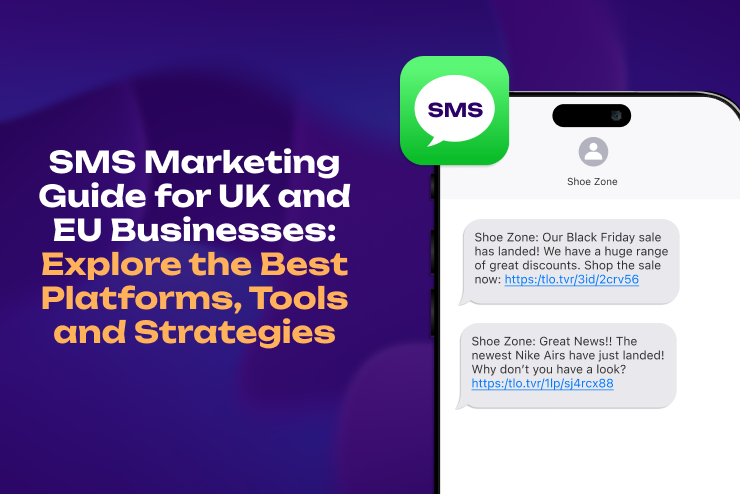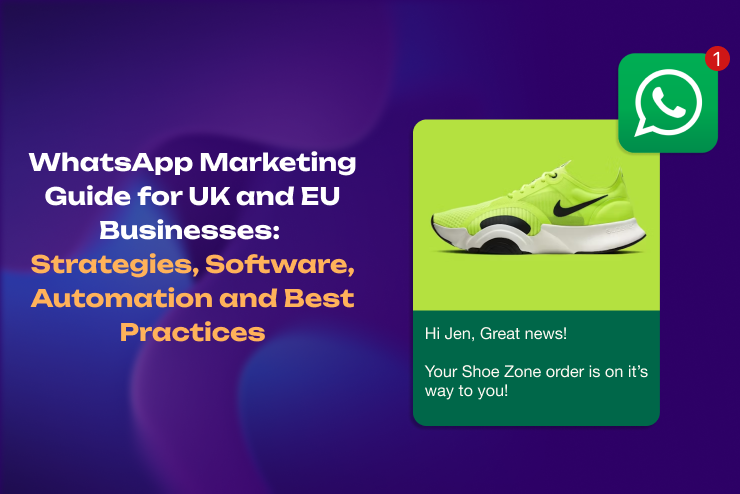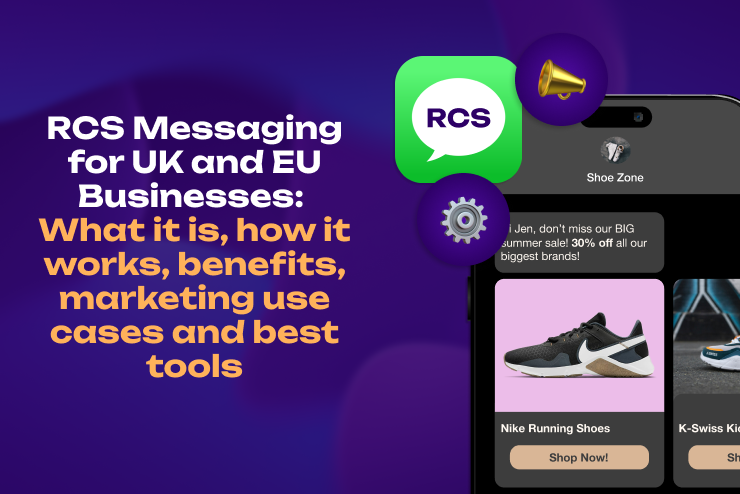RCS vs SMS: What Are The Key Differences?
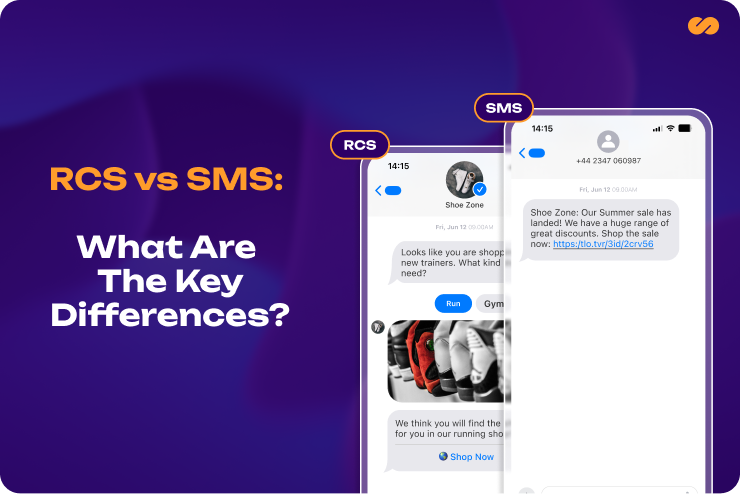
Over the past 30 years, SMS messaging has become the go-to method to communicate with people around us. While its features may be limited, it’s still seen as a powerful marketing tool to interact with audiences.
With technology advancements, there’s always something new around the corner. Enter MMS, which introduced multimedia elements alongside text in the early 2000s.
Later in the decade, the concept of RCS was first mentioned, but it took a while to come to fruition. Finally, in 2019, it began to be rolled out to Android devices and promised a new messaging experience.
Following Apple’s announcement in 2024 that RCS would be supported on iOS devices, it’s ncartow starting to see widespread adoption. As with any new channel, it’s important to weigh it up against existing options to understand the benefits it can bring.
What is RCS?
RCS, also known as Rich Communication Services, is an enhanced messaging service. It offers a new level of interactivity compared to traditional SMS and MMS messaging. This includes the ability to incorporate media and product carousels, as well as suggest next steps for your recipients.
Similar to messaging apps like iMessage or WhatsApp, RCS also provides read receipts and typing indicators. With this elevated level of analytics, you can see in real-time how audiences are interacting with your messages.
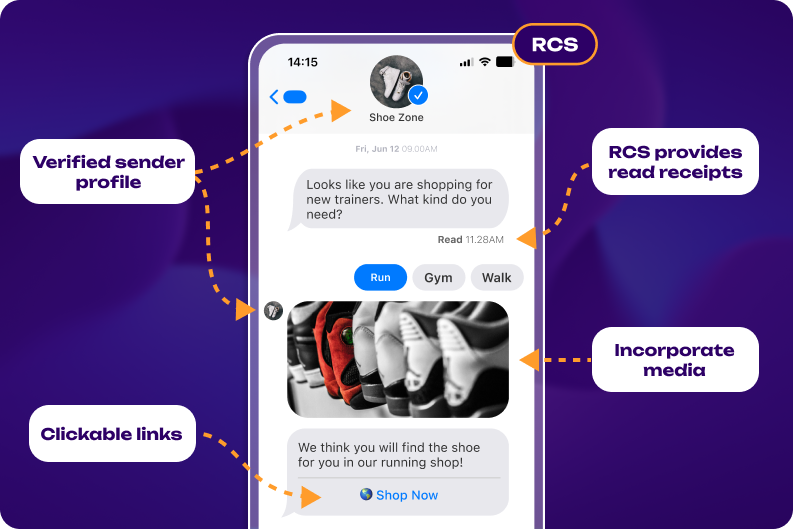
Pros of RCS messages
Richer media
Standard SMS messages are limited in terms of interactivity. But RCS opens up a whole new world of possibilities, with richer media. Within RCS messages, you can include high-resolution media such as videos, images, and GIFs.
You can also guide user interactions with suggested replies, with the ability to embed clickable links.
Verified sender profile
RCS allows you to display your full branding, including company name, brand logo, and brand colours. You can also verify your business, which will then ensure that a verified badge is displayed within your messages.
In a world where spam messages are not uncommon, RCS allows you to build trust and credibility with your audience.
Enhanced analytics
If your business is relying on SMS, you'll probably be struggling with gaining insight into message performance. This is hardly surprising considering that the first SMS message was sent back in 1992.
However, RCS provides enhanced data and analytics. With read receipts and real-time typing indicators, you can instantly see audience interactions. This can help you understand what messages perform best and inform future communications.
Cons of RCS messages
Reliance on a data network
Unlike SMS messages, which rely on a cellular network, RCS messages are delivered via mobile data or Wi-Fi. This can mean that messages can be delayed if the user has no access to data.
While this isn’t a major issue, it could pose potential problems if you are using RCS to send time-sensitive messages.
Not currently available in all countries
While RCS has been available on Android devices for some time, it’s still in its infancy across all countries worldwide. However, as RCS adoption grows, it’s set to become available in more and more countries.
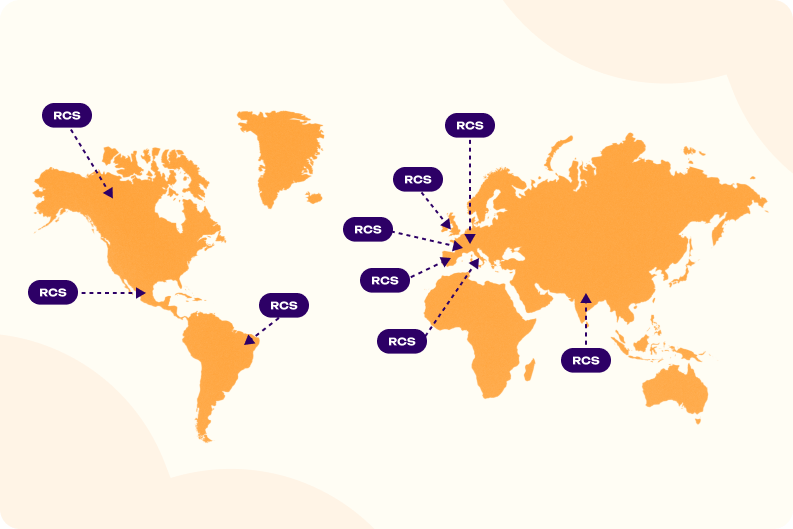
Currently, RCS has been fully adopted in:
- Canada
- Mexico
- Brazil
- The UK
- Germany
- France
- Spain
- Italy
- India
Still being rolled out across carriers and devices
In addition to not being available in all countries, RCS is still limited to specific carriers and devices. It’s widely supported on most Android devices, but is currently only supported on Apple devices that run iOS 18.1 or later.
Many mobile carriers are also still in the process of rolling out RCS to their networks as demand continues to grow.
What is SMS?
SMS stands for Short Message Service and was first introduced back in 1992. As the name suggests, it’s a messaging service for short text-based messages. It’s widely used for both business and professional use, and is supported by all mobile devices.
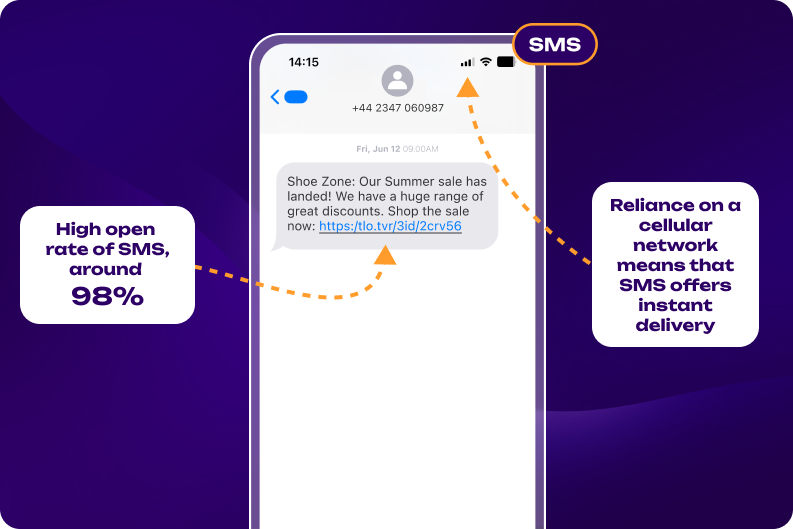
Pros of SMS messages
Deliverability
The reliance on a cellular network means that SMS offers instant delivery. This makes it a great option if you are looking to send mass or time-sensitive messages. Many RCS messages will also default to SMS if the user’s device isn’t supported.
High open rates
It’s estimated that people spend on average around four and a half hours per day using a mobile phone. This undoubtedly contributes to the high open rate of SMS, which is around 98%.
Available across all devices
SMS is supported on all modern mobile phones, unlike RCS which is currently only available across Android and Apple devices with iOS 18.1 or later.
Cons of SMS messages
Limited features
While SMS messages are one of the most common forms of communication, it does have limitations beyond just text. These restrictions mean that it's difficult to fully engage with your audience authentically.
As consumers seek meaningful interactions with brands, SMS can seem impersonal and outdated.
Character limit
SMS messages typically have a limited character count, with a maximum of 160 characters. This can make it hard to convey your message and encourage users to take further action.
If you do exceed the limit, the message is then split into multiple parts and treated as separate messages. Due to this, you could end up paying extra and increasing your SMS spend.
Spam potential
SMS is unfortunately becoming an increasingly easy way for people to carry out phishing scams. Messages can appear to be from a verified company or business, but upon closer inspection, they could be a scam.
This can ultimately lead to your messages being deleted if people are unsure of their legitimacy.
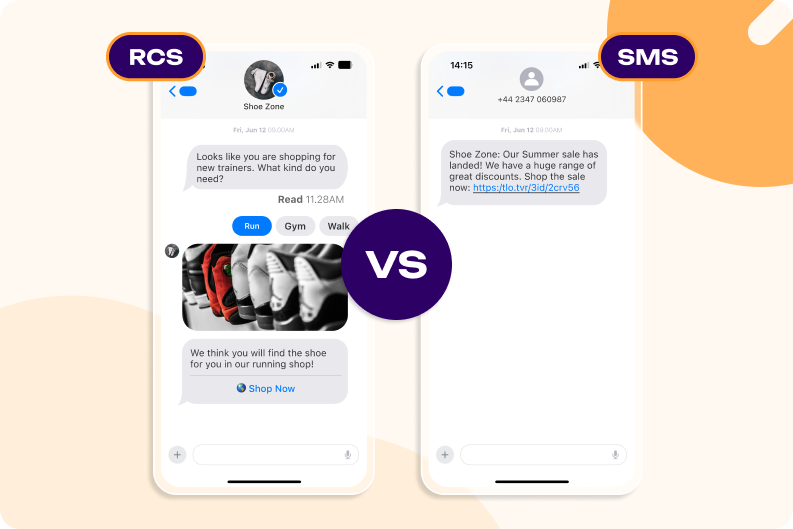
RCS vs SMS - which is better?
Deciding whether RCS or SMS is better depends on your business goals. While RCS is setting a new standard for consumer interaction, it’s still not available globally. However, it’s being rolled out to more and more countries as demand grows for this new channel.
SMS will always be a channel you can count on for its reliability and high open rates. As RCS adoption grows and new features are introduced, more businesses are likely to use it alongside SMS for a more omnichannel approach.
Embrace the RCS era with SaleCycle
Ready to elevate your marketing campaigns with a new level of interactivity? Talk to us today to see how RCS can help you boost your open rates and conversions.
You can also discover everything you need to know about RCS in our complete guide to RCS messaging.
FAQs - RCS vs SMS for UK Businesses
Is RCS available to all UK mobile users?
Not yet. RCS requires both sender and recipient to have RCS-compatible devices and networks. Many Android users can access it, however only iPhones with iOS 18.1 or later only currently support RCS.
Can I send RCS messages from my existing SMS platform?
Only if your provider supports RCS. You may need to upgrade to a messaging platform that enables RCS, often through Google’s Business Messages or approved RCS aggregators.
Are RCS messages more expensive than SMS?
Yes, RCS can cost more than SMS, but it offers richer features like images, carousels, and chat-like interactivity that may improve engagement and ROI.
Does RCS work without internet access?
No, RCS requires a data or Wi-Fi connection. If unavailable, the message may fall back to SMS if your provider supports fall back functionality.
Is RCS secure for sending sensitive business info?
RCS has improved security over SMS, including verified sender IDs and encryption in transit. However it's currently only end-to-end encrypted if the chat is between Google Message users.



